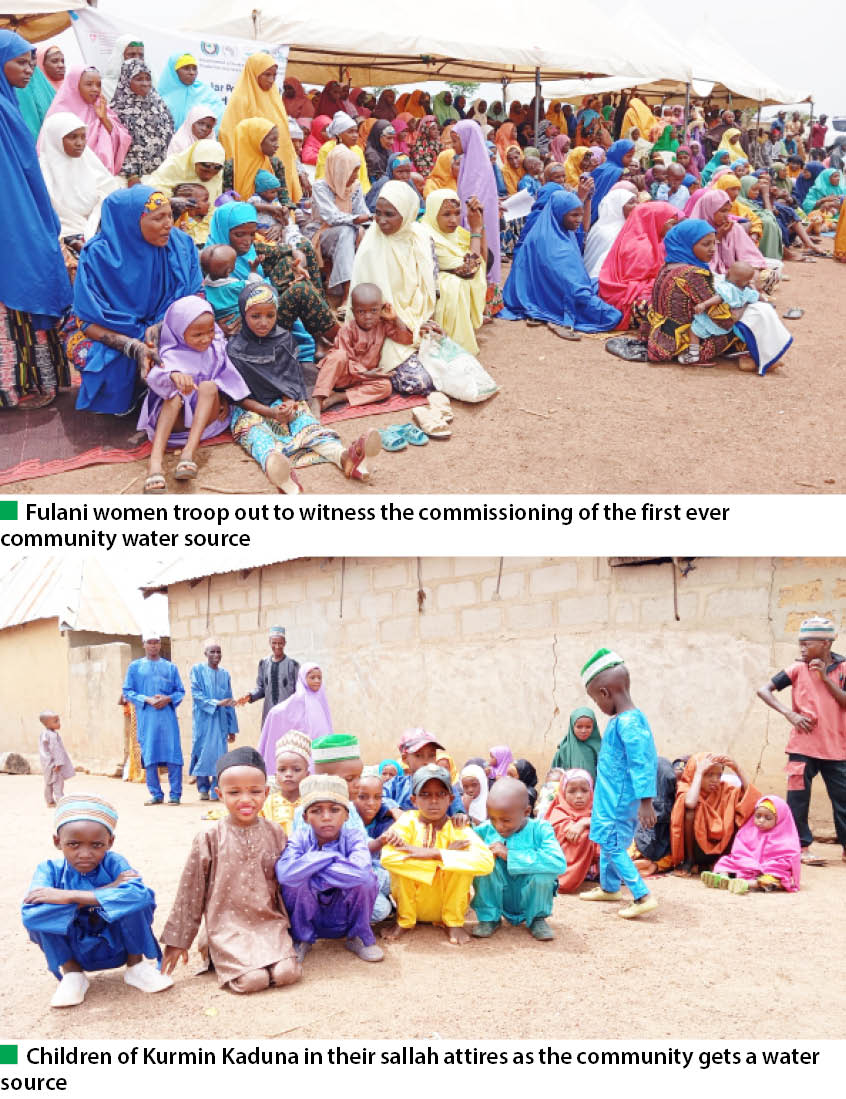Respite for Kaduna community after years of water scarcity
For residents of Kurimin Kaduna community in Chikun Local Government Area of Kaduna State, the provision of a solar borehole by the Milk Value Chain Foundation (MVCF), with support from the Economic Community of West African State (ECOWAS) and other partners, is like discovery of oil. Dressed in their Sallah cloths, residents of the community, […]

For residents of Kurimin Kaduna community in Chikun Local Government Area of Kaduna State, the provision of a solar borehole by the Milk Value Chain Foundation (MVCF), with support from the Economic Community of West African State (ECOWAS) and other partners, is like discovery of oil.
Dressed in their Sallah cloths, residents of the community, including women and children, who are predominantly cattle herders and milk maids, came out to celebrate their first solar-powered water source after many years of poor access to potable water.
Before the intervention, the residents relied on unclean sources of water for them and their cattle until about three years ago when Zaidi Farms (a nearby farm in the community) was established. But they still had to walk a long distance before getting access to water, until now when there is the provision of water source right at their doorsteps.
A resident of the community, Halima Jibrin, who is also the secretary of the Luumo Kosam Cooperative Society created to train and empower women and youths in the area, said that with the borehole, they had been given another lease of life.
- Six years after, Edo community battles installation of clan head
- Lack of water threatens children’s education in Kano community
“It has not been easy. For many years, we have endured without water, especially since we also fend for our cattle. We are very grateful for this gesture, which will go a long way to ease our daily activities. We will no longer walk a long distance to fetch water.
“We are also very grateful to them because they have empowered us with knitting and sewing skills, as well as soap and cream making to help us make a living although we supply milk on a daily basis to Zaidi Farms and get our pay weekly,” Jibrin said.
A representative of the ECOWAS Commission, Aliyu Umar, disclosed that the initiative was under the Project Enhancing Youth Employment, through improved dairy production and feed enterprise (EYEDAF), noting that the dairy sector in West Africa has the potential to create jobs among youths, increase incomes and reduce poverty in the region.
He said, “Unfortunately, the sector is challenged by poor and obsolete infrastructure and archaic practices, among others.”
To reverse this trend and contribute towards the reactivation and elevation of standards in the sector, he said ECOWAS initiated the third phase of the Regional Programme of Support for Farmers’ Organisations (PRAOP3) among member states, with a view to finding lasting solutions to the concerns of actors in the dairy sector.
Also speaking, Ambassador Musa Nuhu, the permanent representative of Nigeria to ECOWAS said, “It is within this framework that the government of Switzerland, through the Swiss Agency for Cooperation (SDC), signed a financing agreement with ECOWAS to fund the support for the capacity building of the commission for the implementation of the regional section of the regional investment programme.
“We are here to celebrate the partnership between ECOWAS and MVCF, which has resulted in the establishment of this modern solar-powered borehole with a water gallery and animal drinking trough for the supply of water to humans and their animals, thus providing the basic requirement for youth employment through family farms and fodder production.”
He urged the beneficiaries to judiciously utilise and maintain the facility that would support youth employment by providing water to family-owned farms and fodder production, reduce human and animal disease, increase milk production and income to the beneficiaries and reduce beneficiaries’ drudgery.
However, the chairman of Luumo Kosam Cooperative Society, Idi Mukhtar Maiha and founder, Zaidi Farms, expressed gratitude to the ECOWAS Commission and Swiss Cooperation for the provision of the solar-powered borehole for domestic consumption and animal watering.
“We thank you immensely for finding us worthy recipients of these laudable projects for the enhancement of dairy production and the upliftment of the quality of life of our members. I also want to register our appreciation to the partners on this project—MVCF, CORET and NCNE – for the demonstrated leadership capacity and indefatigable commitment.
“We also appreciate and thank the exemplary roles played by the Kaduna Agriculture Ministry KADGIS and KASUPDA and other agencies of the Kaduna State Government in this endeavour,” he said.
The chief executive officer of Milk Value Chain Foundation, Dr Ishaq Bello, said Luumo Kosam Cooperative Society was one of the youngest cooperatives that MVCF is working with, but they have shown great results in the areas of social organisation, savings, empowerment of their members and consistent supply of milk to off takers.
He said the borehole would greatly boost milk production as access to clean water was a daily struggle, which led to low milk production, with cows producing less than 2liters per day.
